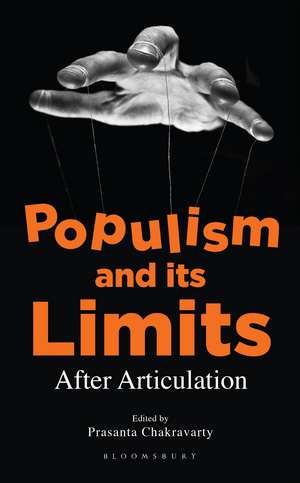Populism and Its Limits: After Articulation
Prasanta Chakravartyen Limba Engleză Hardback – 17 oct 2020
Preț: 509.71 lei
Preț vechi: 730.78 lei
-30% Nou
Puncte Express: 765
Preț estimativ în valută:
97.56€ • 102.50$ • 81.99£
97.56€ • 102.50$ • 81.99£
Carte disponibilă
Livrare economică 19 februarie-05 martie
Preluare comenzi: 021 569.72.76
Specificații
ISBN-13: 9789389449549
ISBN-10: 9389449545
Pagini: 296
Dimensiuni: 135 x 216 mm
Greutate: 0.46 kg
Editura: Bloomsbury Publishing
Colecția Bloomsbury Academic India
Locul publicării:New Delhi, India
ISBN-10: 9389449545
Pagini: 296
Dimensiuni: 135 x 216 mm
Greutate: 0.46 kg
Editura: Bloomsbury Publishing
Colecția Bloomsbury Academic India
Locul publicării:New Delhi, India
Caracteristici
To think about the cultural and inter-personal dimensions of populism: symbolism, style, communicative strategies, iconography and so on.
Notă biografică
Prasanta Chakravarty is Associate Professor of English at the University of Delhi and the editor of the web-journal humanitiesunderground.org.
Cuprins
Introduction: After Articulation-Prasanta Chakravarty First Principles1. The Rift - Milind Wakankar2. The Passage of Hate - Sanil V.3. The 'Ismos' of the Many - Shaj MohanConjectures4. Beyond Reason: The Subject of Desire and Enjoyment in Populism - Gautam Basu Thakur and Meghant Sudan5. Agonism and the 'Revolutionary-Becomings': Mouffe, Deleuze and 'The Populist Moment' - Raghu Menon Jayakumar6. On the Deconstructive Logic of Populism - Samir Gandesha7. Populism Lite - Prasanta ChakravartyExpositions8. The Borrowed Geographies of Neoliberal Neighbourhoods: Populist Governance in India - Rajarshi Dasgupta9. Individuation and the Authoritarian Public: Rajelakshmy's A Path and Many Shadows - Urmila G. and Nikhil Govind10. The Popular, Populist and the Political in Priyadarshan's Films - Yadukrishnan P.T.Branchings11. The Non-Populist Popular and the Cinematic Apocrypha - Parichay Patra12. The Future of Non-Populism - Debraj DasguptaIndex About the Editor and Contributors
Recenzii
Perhaps the most effective way to counter populism, and its assault on popular sovereignty is to produce scholarship that determinedly reverses its sleights of hand-its reduction of complex social fields to the brute opposition of 'the people' versus 'the elite' or empathy versus objectification; or that puts back the histories of the present that populism systemically erases. But this sparkling collection-one of the most imaginative engagements with the topic to date-does more: it undertakes the painstaking task of rethinking the political itself, of envisioning forms of inclusive participation that can foster relationality, open contestation and even transformation.
As 'populism' has turned into a debased token in our everyday political discourse, so has theorizing about it often descended into platitude or polemic. This probing, multi-faceted and sophisticated collection succeeds in revitalizing the question of populism as a problem for thought and practice. Impressively ranging across political philosophy, cultural theory and psychoanalysis, Populism and Its Limits excavates hitherto neglected facets of the antagonistic and affective politics of the people while critically displacing a debate that has often been limited by its exclusive reference to the Western hemisphere.
This volume fills a gap in the literature on populism by bringing in the Indian perspective-without confining the analysis to India-centric case studies. On the contrary, this is a comprehensive study of this -ism from a theoretical, comparative and empirical point of view. A very timely and systematic must-read that shows that populism and authoritarianism have clear affinities!
In recent years, there has been a great deal of superficial discussion of populism but not so much deep thinking. Happily, this book offers serious and original intellectual engagement. Its questions are of the utmost importance for both politics and political theory. Its focus is on India but not as a special case. It integrates what is happening in and to the world's largest democracy into a more global discussion of this 'populist moment'.
As 'populism' has turned into a debased token in our everyday political discourse, so has theorizing about it often descended into platitude or polemic. This probing, multi-faceted and sophisticated collection succeeds in revitalizing the question of populism as a problem for thought and practice. Impressively ranging across political philosophy, cultural theory and psychoanalysis, Populism and Its Limits excavates hitherto neglected facets of the antagonistic and affective politics of the people while critically displacing a debate that has often been limited by its exclusive reference to the Western hemisphere.
This volume fills a gap in the literature on populism by bringing in the Indian perspective-without confining the analysis to India-centric case studies. On the contrary, this is a comprehensive study of this -ism from a theoretical, comparative and empirical point of view. A very timely and systematic must-read that shows that populism and authoritarianism have clear affinities!
In recent years, there has been a great deal of superficial discussion of populism but not so much deep thinking. Happily, this book offers serious and original intellectual engagement. Its questions are of the utmost importance for both politics and political theory. Its focus is on India but not as a special case. It integrates what is happening in and to the world's largest democracy into a more global discussion of this 'populist moment'.
